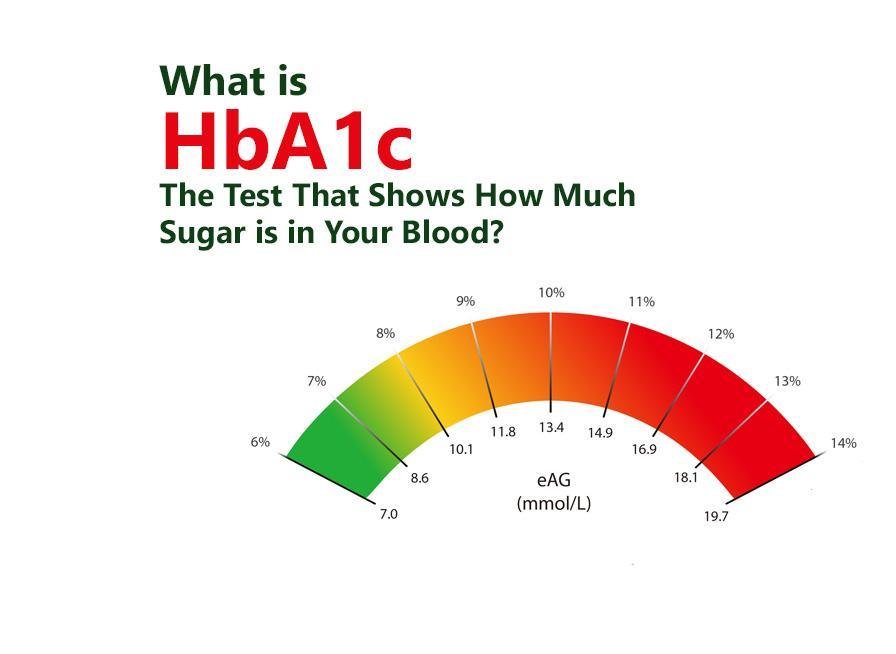What’s the best way to keep track of your blood sugar? For diabetics, one of the most important tests you can have done regularly is your hemoglobin A1c (HbA1c) test. Which measures how much glucose (blood sugar) has been on your red blood cells over the previous three months.
If you want to know more about HbA1c, including who should be tested and what the results mean. Read this in-depth guide to this important diagnostic test for diabetes management and monitoring.
What Is HbA1c?
The A1C test, also called a glycated hemoglobin test, measures blood sugar control over the past 3 months. It’s not intended to diagnose diabetes but is used with other factors such as age and weight to estimate the risk of developing diabetes within 10 years.
This blood test can also be used to monitor how well you are controlling your blood sugar levels.
The A1C levels are reported as a percentage and compare your A1C level with those of people without diabetes. For example, an A1C level of 7% means that the average person would have an A1C of 7% or less if they did not have diabetes.
An A1C level of 8% means that the average person would have an A1C level below 8%. 9% may mean that someone has prediabetes; 12% might indicate type 2 diabetes. (For more information on what your doctor might say about these numbers, see What Do My Results Mean?)
The A1C test is different from the finger-stick glucose tests sometimes used by doctors.
Although both tests measure your blood sugar levels, the glucose tests tell you what’s happening right now. While an A1C test tells you what happened over time–a much better picture of whether or not your diabetes treatment is working.
Why this is Important?
High blood sugar levels are a major risk factor for many health conditions, including diabetes. High blood sugar can happen when the body doesn’t make enough insulin or when the body becomes resistant to its effects.
The most important measurement of blood sugar is what we call A1C (also called glycated hemoglobin).
HbA1c reflects your average blood sugar levels over the past 2-3 months. If you have stable A1C levels, it means that your current diabetes management plan is working well.
But if you notice higher than normal values, then it might be time to change some things up.
The most common causes of high A1C are poorly controlled diabetes and uncontrolled stress hormones due to illness or emotional distress.
You should talk with your doctor about making changes to your diabetes management plan if these symptoms persist for more than 3 weeks or worsen.
Should I Get Tested?
If you have been told by your doctor that you need to monitor your blood sugar levels. Then the first step is to find out what test will be most helpful for you. This blog post will answer the question what does HbA1c mean? And how do I know if I should get tested? Keep reading to learn more.
How Do I Know if I Should Get Tested: You may need an HbA1c test if your doctor has diagnosed you with diabetes, pre-diabetes, or another condition related to high blood sugar.
Other reasons to ask for an HbA1c test include: unexplained weight loss, frequent urination at night or excessive thirst, blurry vision (without other symptoms), unexplained itchy skin rash, or dry mouth
Your Doctor’s Advice: Ask your doctor whether an HbA1c test would be a good idea. They can tell you which kind of testing is best suited for your needs and how often it should take place.
Do an 8 Mean Good and a 5 Mean Bad?
An 8 means that your blood sugar levels are normal. A 7 means that your blood sugar levels are higher than normal, but still within a healthy range. A 6 means that your blood sugar levels are moderately high, but still below the threshold for diabetes.
A 5 or less means that you have diabetes and need to see a doctor right away. Anything over 9 on the test indicates an unhealthy level of glucose in the blood.
Anything between 6 and 9 might indicate prediabetes. To find out if you have prediabetes, take another test in three months to measure your progress and repeat until there’s a positive diagnosis (in which case you should start taking care of yourself).
If it remains negative after several tests, then you’re most likely not prediabetic.
Are There Any Treatments If I Have Diabetes?
The American Diabetes Association recommends checking for diabetes if your fasting blood sugar level is 126 mg/dL or higher, or if you have symptoms of the disease.
The test most often used to diagnose diabetes is called the oral glucose tolerance test. It measures how much glucose is in your blood after an overnight fast and 2 hours after drinking a solution of glucose.
Another important test that may be ordered to diagnose diabetes is called an A1C test (also known as hemoglobin A1C).
This test checks for sugar in the red blood cells that have been around the longest. Both tests are done by drawing a sample of blood from a vein.
Real-Life Examples
You may have heard about this test before, especially if you have diabetes. It’s also known as a glycemic index.
HbA1c stands for glycosylated hemoglobin, a form of hemoglobin (part of your red blood cells).
The A1C level represents the percentage of sugar that has been attached to your hemoglobin. The higher the number, the more sugar molecules are on your hemoglobin, and thus there will be more sugar floating around in your bloodstream.
An A1C level between 4 and 5 means that 25% of all of the sugar present in your bloodstream was attached to protein and 75% was free-floating.
For someone with Type 1 Diabetes who takes insulin injections or receives an insulin pump therapy. Their goal would be to keep their average glucose levels below 150 mg/dL or 7 mmol/L and therefore they would want their HbA1c levels below 6%. The highest number seen without any symptoms is 6.5%. Which will not show any immediate signs but can lead to long-term complications like nerve damage and blindness later on down the line.




obviously like your website but you need to test the spelling on quite a few of your posts Several of them are rife with spelling problems and I to find it very troublesome to inform the reality on the other hand Ill certainly come back again
Hi! I noticed you visited my site, so I’m returning the favor. I’m looking for ideas to improve my own site, and I appreciate the inspiration. Hope it’s okay if I take some cues from here.